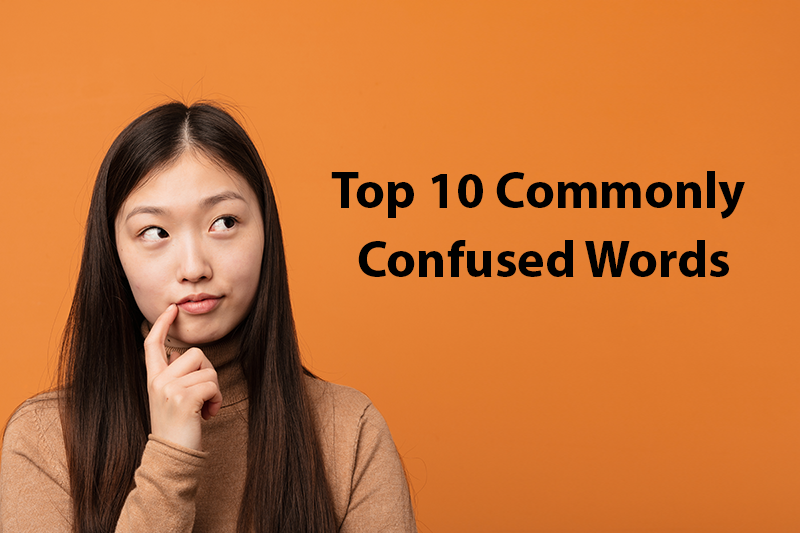Last week, we addressed the top 5 punctuation mistakes that writers typically make in their writing. This week, we will discuss the most frequently confused words in written English.
We use a lot of homophones when we speak. Homophones are words that sound the same but have different meanings and spellings. Examples are “your” and “you’re” and “its” and “it’s.” In our writing, it can become difficult to remember the spellings of these words. We often think of word confusion as a spelling mistake, but most of the time these “spelling errors” are actually reflective of grammar and writing conventions that need to be practiced regularly. Upon close reflection, these “spelling mistakes” can be classified as confusion between 1) contractions and possessives and 2) different parts of speech.
Homophones with Contractions and Possessives (L.2.2.C) (L.3.2.D) (L.4.1.G)
1. “Your” and “You’re

The adjective “your” is used to show possession, for example, “I like your shoes.” The shoes belong to you, and therefore they are “yours.” Its homophone “you’re” is a contraction meaning “you are.” People often confuse the two when they forget they are using a contraction for the words “you” and “are.” If you are wondering which one to use while writing, try breaking apart the contraction and saying “you are” in the sentence instead. For example, “I like you are shoes.” That sentence doesn’t make sense, so you should spell the word “your” instead of “you’re.”
2. “Its” and “It’s”

Similar to the previous example, people often confuse the homophones “its” and “it’s.” The adjective “its” is used to show possession, for example, “The dog licks its paws.” The paws belong to the dog, so the possessive adjective is used. Its homophone (see what I did there?) “it’s” is a contraction meaning “it is.” People often confuse the two when they forget to use a contraction for the words “it” and “is.” If you are wondering which one to use while writing, try breaking up the contraction and saying “it is” in the sentence instead. For example, “The dog licks it is paws.” That sentence doesn’t make sense, so you should spell the word “its” instead of “it’s.”
3. Whose” vs. “Who’s”

Similar to the previous examples, people often confuse the homophones “whose” and “who’s.” These words are confusing because they both come from the pronoun “who,” and both are used to ask questions. The adjective “whose” is used to show possession, while “who’s” is a contraction of the words “who” and “is.” In the example above, you can’t say, “Who is car is that?” That question doesn’t make sense. You are asking someone to whom the car belongs. Before using a contraction, split it into two words to make sure it makes sense in the sentence.
4. “There,” “Their,” and “They’re”

There are a lot of different ways to use the word “there.” (See what I did there?) The issue lies in the fact that this homophone is used as an adverb (there), a possessive adjective to show ownership (their), and a contraction (they’re). We use “there” to modify verbs, for example, “Look over there!” The word “there” describes the verb “to look.” We use “their” as a possessive adjective, for example, “Their teacher is strict.” The teacher “belongs” to the students in the classroom, so we describe the noun by saying, “their teacher.” Finally, “they’re” is a contraction of the words “they” and “are.” We cannot use it as an adjective or adverb. If we tried to break the contraction up in the example sentence, it would read, “They are parents are crazy.” That doesn’t make sense, so we know that we cannot use the contraction “they’re” without changing the structure of the sentence. When using this homophone, be sure to think about how the word is being used, and that will help you determine the correct spelling.
5. “Of” and the contraction for “Have”

The preposition “of” and the contraction “‘ve” sound very similar so it is easy to get them confused in our writing. The sentence, “I should of washed the dishes,” actually doesn’t make any grammatical sense, though. When we want to say, “I should of,” “I could of,” or “I would of,” what we actually mean is “I should have,” “I could have,” or “I would have.” Therefore, the contraction ”’ve” should be used, or we need to spell out the verb “have” to match the modal auxiliary verb.
6. “To and “Too”

People often confuse “to” and “too” in their writing. The confusion lies in when to use the preposition “to” versus the adverb “too.” We use the former to say, “I am going to the store,” or “I am going to finish that as soon as I can.” We use “too” as a synonym for the adverb “very” or “as well.” For example, “You are too (very) funny,” or “I want to go to the playground too (as well)!” If you are unsure of which form to use, try substituting “very” or “as well” in place of “too.” For example, if you say, “I am going very the store,” that doesn’t make sense, so we need to use the preposition “to.” These words are so common that you may find yourself using “to,” “too” and the number “two” in the same sentence, so make sure you are paying attention to your spelling!
7. “Affect” and “Effect”

Adults often confuse the words “affect” and “effect.” An easy way to remember the difference is that “affect” is used as a verb meaning “to influence or impact,” and “effect” is most often used as a noun meaning, “the result of a cause.” This is why we say, “cause and effect” instead of “cause and affect.” An easy way to remember the difference is if we substitute the word “affect” with “influence,” or “impact,” for example, “We need to influence his decision.” If the verb “influence” makes sense in the sentence, then the verb “affect” should be used.
Where this becomes complicated is with the adjective usage of “effect” vs. “affect.” Most of the time, we will use the adjective form of “effect” to describe the degree to which we can get the desired result. For example, “She was an effective speaker,” meaning that she was a speaker that was successful in the act of speaking. She would be an ineffective speaker if she was not persuasive in her speaking abilities. The adjective “affective” would be incorrect in this case, and it is only used in special circumstances within the discipline of psychology.
8. “Lie” and “Lay” (L.5.1.B) (L.5.1.D)

The verbs “to lie” and “to lay” are frequently confused because of their similar spellings and usage. “To lay” is a verb that means “to put or set (something) down.” Therefore, it needs a direct object. An example sentence is, “Please take your purse and lay it on the floor.” The purse is the object that needs to be laid on the floor. “Laid” is both the past tense and past participle.
People often confuse this with the verb “to lie,” which does NOT just mean “to reveal something untrue.” It also means “to be in a horizontal position.” The problem is that the spelling for the present tense of “to lay” is the same as the past tense of “to lie.” People rarely use the past participle, “had lain” correctly in a sentence, because of this verb confusion. Practice using these verbs correctly in the present, past, and perfect tenses using the chart below. If all else fails, remember: if you lay down your utensils before you feel full, you won’t have to lie down later from overeating.

9. “Then” and “Than” (L.3.1.G)

“Then” and “than” are two words that are often confused because they sound similar, but have very different uses. “Then” is used to describe an event that comes after in TIME. For example, we can say, “She went to the store, and then she went to the post office.” It is an adverb that relates to time. If you can replace the word “then” with phrases like “after that” or “at that time,” you are using the word correctly.
The word “than” can be used to compare and contrast, like in the sentence, “This cookie is worse than that cookie.” To show contrast, you can say, “They read rather than write.” If you are using the word “then” to make a comparison, you probably want to be using the word “than.”
10. “Lose” and “Loose”

Finally, two words that sound similar but have very different parts of speech are “lose” and “loose.” “To lose” is a verb meaning “to misplace or fail,” while “loose” is most often used as an adjective describing how something fits. We use the verb “to lose” to say, “Your team is going to lose the baseball game.” We would use the adjective “loose” to say, “My clothes are loose on me because they are too big.”
Where this can get complicated is when we also use “to loosen” as a verb. We use the verb “to loosen,” meaning, “to make free.” For example, you would “loosen the knots on a rope in order to break free.” This usage is less common, however, so most of the time you will use “loose” as an adjective to describe nouns.
How Afficient Academy Helps Writers with Commonly Confused Words
At Afficient Academy, we are proud to offer lessons and practice with commonly confused words, homophones (words with similar sounds), and homographs (words with the same spellings) throughout our Afficient English curriculum. Our students don’t just practice a few exercises once; they have to demonstrate proficiency consistently throughout the program. This ensures that students don’t forget these complex concepts over time, as they progress through the Learning, Proficiency, and Afficiency sections of our product. Our program also ensures that students continue to practice skills as they advance in grade levels, so elementary skills won’t be forgotten as students move on to more complex concepts. Take our FREE diagnostic test to find your instructional level in English language arts and get to work mastering commonly confused words at an accelerated pace. Stay tuned for an article next week on 5 different ways to improve your writing style!
Sources:
https://www.businessinsider.com/microsoft-data-the-most-common-grammar-mistakes-2017-3
https://www.grammarly.com/blog/30-grammar-mistakes-writers-should-avoid/
https://prowritingaid.com/art/231/Top-10-Grammatical-Errors-You-Can-Fix.aspx
https://blog.hubspot.com/marketing/common-grammar-mistakes-list





